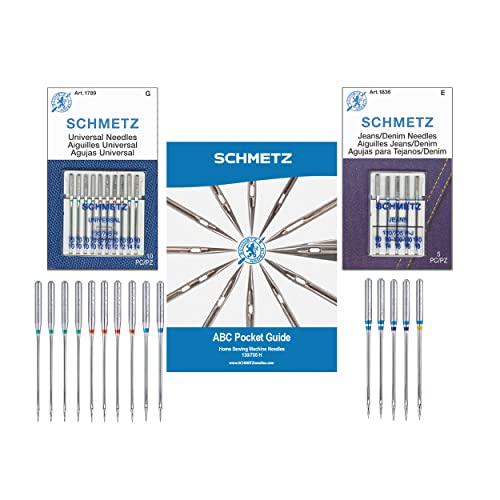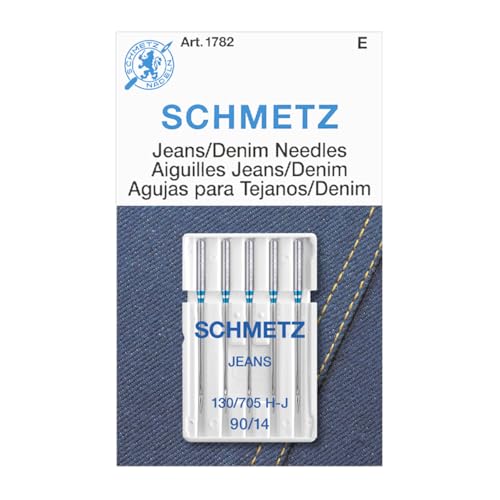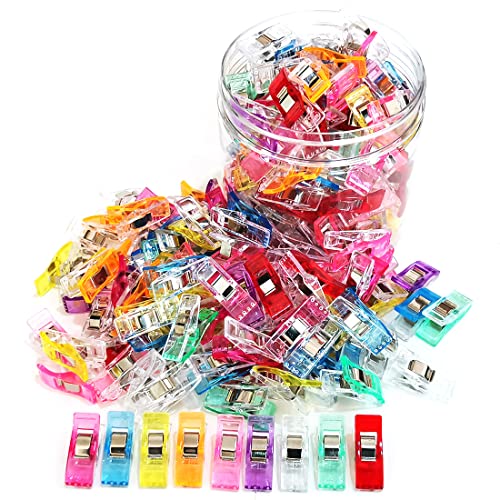As a sewing enthusiast, I know how challenging it can be to find the right sewing machine for denim. Denim is a thick and sturdy fabric that requires a powerful machine to handle it. A regular sewing machine may not have the necessary features to sew through denim smoothly, resulting in skipped stitches, broken needles, and frustration.
In this article, I will share my research and experience to help you find the best sewing machine for denim. I will discuss the key features to look for when choosing a sewing machine for denim, including the motor power, stitch options, needle and presser foot considerations, speed and tension control, and additional features for enhanced sewing experience. I will also provide a closer look at some of the popular sewing machines for denim and share tips and techniques for sewing denim.
Key Takeaways
- A powerful motor and sturdy frame are essential for sewing denim smoothly.
- Stitch options, needle and presser foot considerations, and speed and tension control are important features to look for when choosing a sewing machine for denim.
- Popular sewing machines for denim include Singer 4423 Heavy Duty, Janome HD3000, and Brother CS7000x Computerized Sewing Machine.
Understanding Denim and Its Sewing Requirements
As a denim lover, I know the importance of having a sewing machine that can handle this tough fabric. Denim is a sturdy cotton twill fabric that is known for its durability and strength. It is a popular choice for clothing such as jeans, jackets, and skirts, as well as home decor items like curtains and upholstery.
When it comes to sewing denim, you need a heavy-duty sewing machine that can handle the thickness and toughness of this fabric. A regular sewing machine may struggle with denim, causing skipped stitches and broken needles. That’s why it’s essential to invest in a heavy-duty machine that can handle the job.
One of the main requirements for sewing denim is a machine with a 60% stronger motor than a regular sewing machine. This extra power allows the machine to penetrate through the thick layers of denim without any issues. A heavy-duty machine is also designed to handle heavy fabrics, making it the perfect choice for sewing denim.
Another important feature to look for in a sewing machine for denim is an adjustable presser foot. This allows you to adjust the pressure applied to the fabric, which is important when dealing with thick fabrics like denim. A heavy-duty machine also has a larger needle hole, allowing you to use thicker needles that are necessary for sewing denim.
In summary, when it comes to sewing denim, a heavy-duty machine is a must-have. Look for a machine with a 60% stronger motor, an adjustable presser foot, and a larger needle hole. With the right machine, you can easily sew through the tough fabric and create beautiful denim pieces that will last for years to come.
Best Sewing Machine for Denim: Key Features to Look For
As a sewing enthusiast, I know how important it is to have the right sewing machine for the job. When it comes to sewing denim, it’s essential to have a sewing machine that can handle the thickness and toughness of this fabric. Here are some key features to look for when searching for the best sewing machine for denim:
Heavy-Duty Sewing Machines
Sewing machines that are labeled as “heavy-duty” are designed to handle thicker fabrics like denim. These machines have a more powerful motor and can sew through multiple layers of fabric with ease. If you plan on sewing denim frequently, investing in a heavy-duty sewing machine is a wise choice.
Versatile Sewing Machine
A versatile sewing machine is another great option for sewing denim. These machines can handle a variety of fabrics, including denim, and have a range of stitch options to choose from. A versatile sewing machine is an excellent choice if you plan on sewing other types of fabrics besides denim.
Computerized Sewing Machine
If you’re looking for a sewing machine with advanced features, a computerized sewing machine is a great option. These machines have a digital display and offer a range of stitch options and settings. Some computerized sewing machines even have automatic needle threaders and thread cutters, making sewing a breeze.
Mechanical Sewing Machine
A mechanical sewing machine is a great option for those who prefer a more traditional sewing experience. These machines are simple to use and don’t have as many bells and whistles as computerized sewing machines. However, they are still capable of sewing through denim and other thicker fabrics.
In conclusion, when looking for the best sewing machine for denim, it’s important to consider the thickness and toughness of the fabric. You’ll want to invest in a heavy-duty sewing machine or a versatile sewing machine that can handle the job. A computerized sewing machine is an excellent option for those who want advanced features, while a mechanical sewing machine is perfect for those who prefer a more traditional sewing experience.
Importance of a Powerful Motor and Sturdy Frame
When it comes to sewing denim, having a sewing machine with a powerful motor and sturdy frame is crucial. These two features work together to provide the necessary strength and stability to handle the thickness and weight of denim fabric.
A powerful motor is necessary to drive the needle through multiple layers of denim, as well as to maintain consistent stitching speed. A motor with a high number of stitches per minute (SPM) is ideal for denim sewing. The Singer Heavy Duty 4452, for example, has a motor with a maximum speed of 1,100 SPM, making it a great option for heavy-duty denim projects.
A sturdy metal frame is also important for sewing denim. The weight and thickness of denim fabric can put a lot of strain on a sewing machine, and a flimsy frame can lead to skipped stitches, broken needles, or even damage to the machine itself. A heavy-duty metal frame, such as those found in the Janome HD3000 and Brother ST371HD, provides the necessary stability to handle the demands of sewing denim.
In addition to providing stability and strength, a sturdy metal frame also helps to reduce vibrations and noise during sewing. This can make for a more comfortable and enjoyable sewing experience, especially when working on larger denim projects.
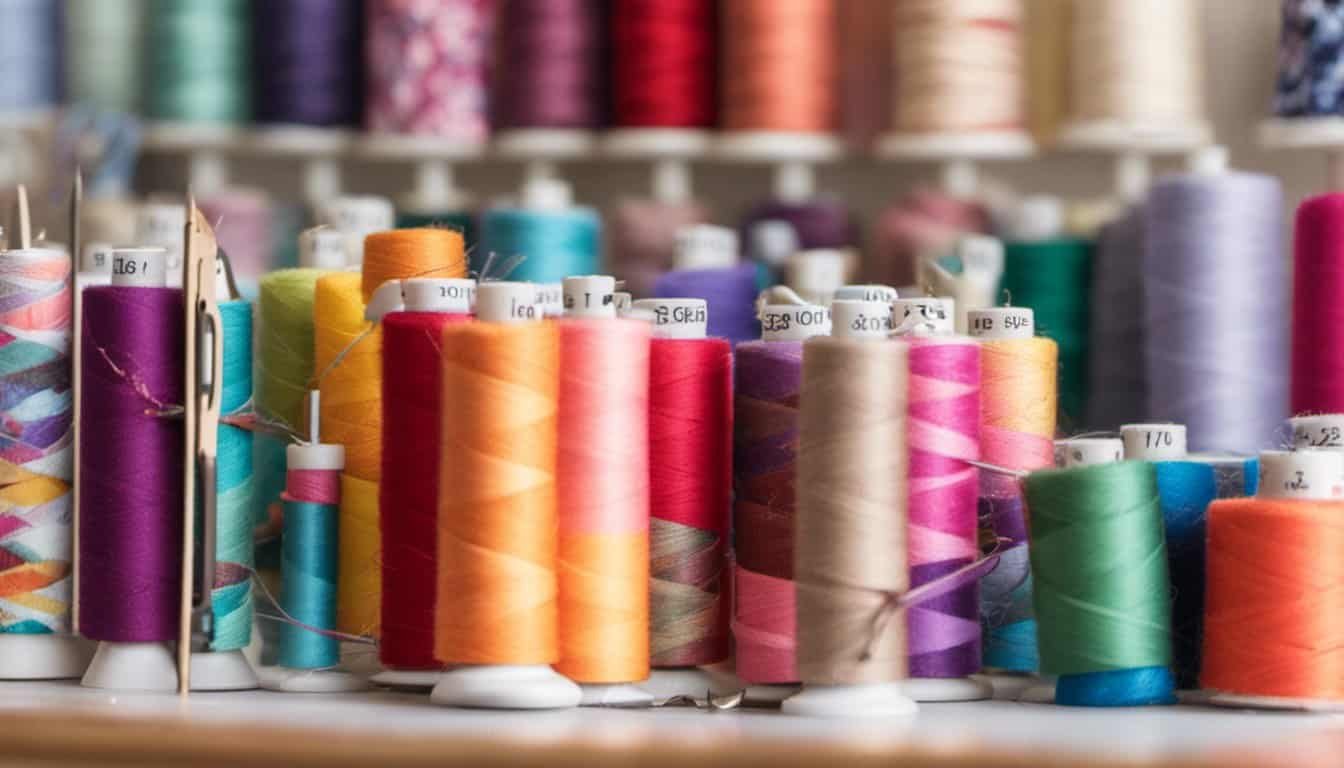
Overall, a sewing machine with a powerful motor and sturdy metal frame is essential for sewing denim. Whether you’re a beginner or an experienced sewer, investing in a quality machine with these features can make a big difference in the quality and durability of your denim projects.
Stitch Options and Their Relevance to Denim
When it comes to sewing denim, having the right stitch options is crucial. Denim is a thick and durable fabric that requires strong and sturdy stitches to hold up over time. Here are some of the most important stitch options to consider when sewing denim:
Straight Stitch
The straight stitch is the most basic stitch option and is perfect for sewing seams on denim. It is a simple stitch that goes straight through the fabric, creating a strong and durable seam. When sewing denim, it’s important to use a longer stitch length to avoid breaking needles or damaging the fabric.
Zigzag Stitch
The zigzag stitch is another important stitch option for sewing denim. It is a versatile stitch that can be used for a variety of purposes, including finishing edges, sewing buttonholes, and creating decorative stitches. The zigzag stitch is also great for sewing stretch denim, which requires a stitch that can stretch with the fabric.
Stitch Length and Width
« Best Sewing Machine for Kids: Fun and Safe Options for Young Crafters
How to Oil a Sewing Machine: A Beginner’s Guide »
When sewing denim, it’s important to adjust the stitch length and width to fit the thickness of the fabric. A longer stitch length is better for thicker denim, while a shorter stitch length is better for thinner denim. Similarly, a wider stitch width is better for thicker denim, while a narrower stitch width is better for thinner denim.
Buttonhole Stitch
If you plan on sewing buttons onto your denim project, then the buttonhole stitch is a must-have stitch option. This stitch creates a strong and durable buttonhole that won’t fray or come apart over time.
Decorative Stitches
If you want to add some flair to your denim project, then decorative stitches are a great option. Many modern sewing machines come with built-in decorative stitches that can be used to create unique and eye-catching designs on your denim.
Overall, having the right stitch options is essential when sewing denim. By using the right stitches and adjusting the stitch length and width to fit the thickness of the fabric, you can create strong and durable seams that will last for years to come.
Needle and Presser Foot Considerations
When it comes to sewing denim, choosing the right needle and presser foot can make all the difference. Here are some considerations to keep in mind:
Needle
Denim is a tough fabric, so you’ll need a needle that can handle it. Look for a needle with a sharp point, such as a denim needle or a jeans needle. These needles are designed to pierce through the thick layers of denim without breaking.
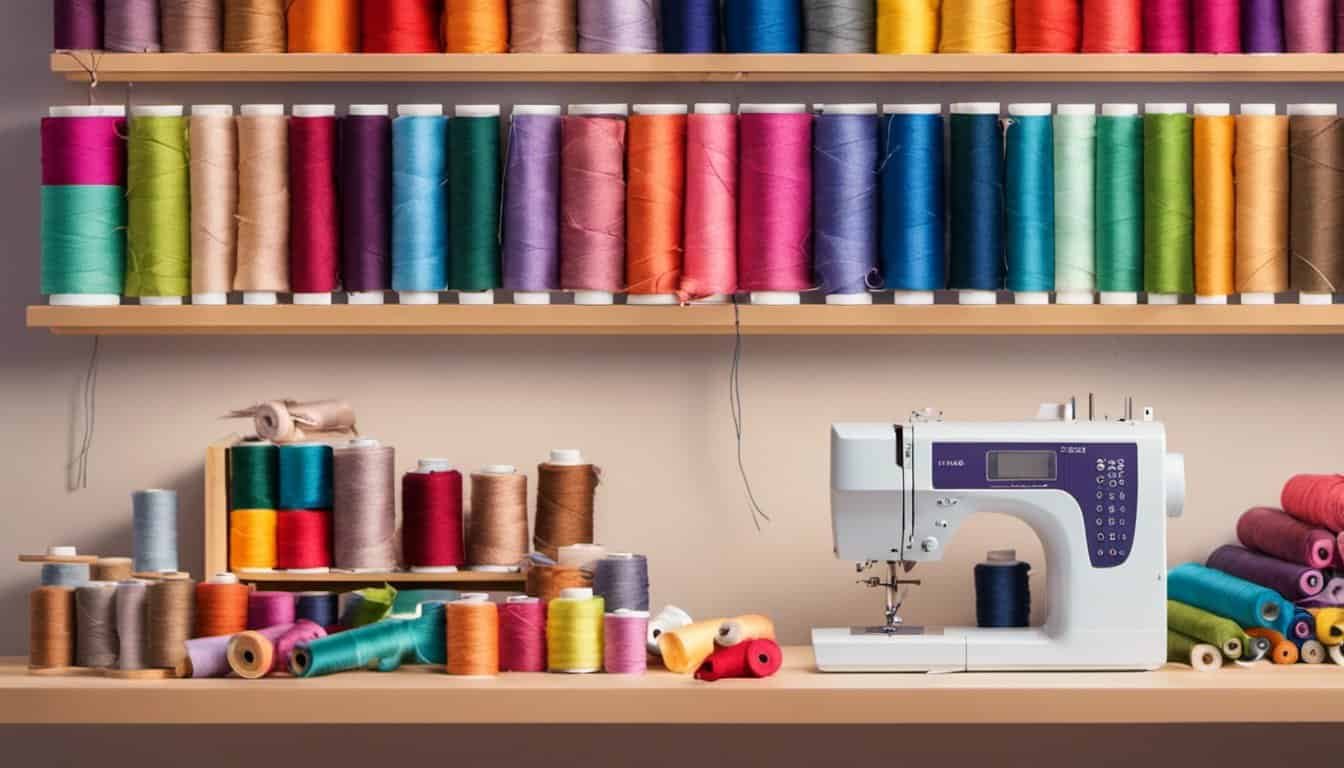
It’s also important to choose the right size needle. A needle that is too small may break, while a needle that is too large may leave visible holes in the fabric. The size of the needle you need will depend on the weight of your denim fabric. As a general rule, use a size 16 needle for medium-weight denim and a size 18 needle for heavy-weight denim.
Presser Foot
A walking foot is a great choice for sewing denim. This type of presser foot has a set of feed dogs that work in conjunction with the machine’s feed dogs to move the fabric through the machine evenly. This helps prevent puckering and ensures that the stitches are even.
If you don’t have a walking foot, a regular presser foot can still work well for sewing denim. Just be sure to adjust the pressure on the foot to ensure that it is pressing down firmly enough to move the fabric through the machine smoothly.
Needle Threader
Threading a needle can be a challenge, especially when working with a thick fabric like denim. Consider investing in a needle threader to make the process easier. Some sewing machines come with an automatic needle threader, which can be a real time-saver.
Presser Feet
There are a variety of presser feet available that can make sewing denim easier. In addition to a walking foot, consider using a denim foot or a jeans foot. These presser feet are designed specifically for sewing denim and can help ensure that your stitches are even and straight.
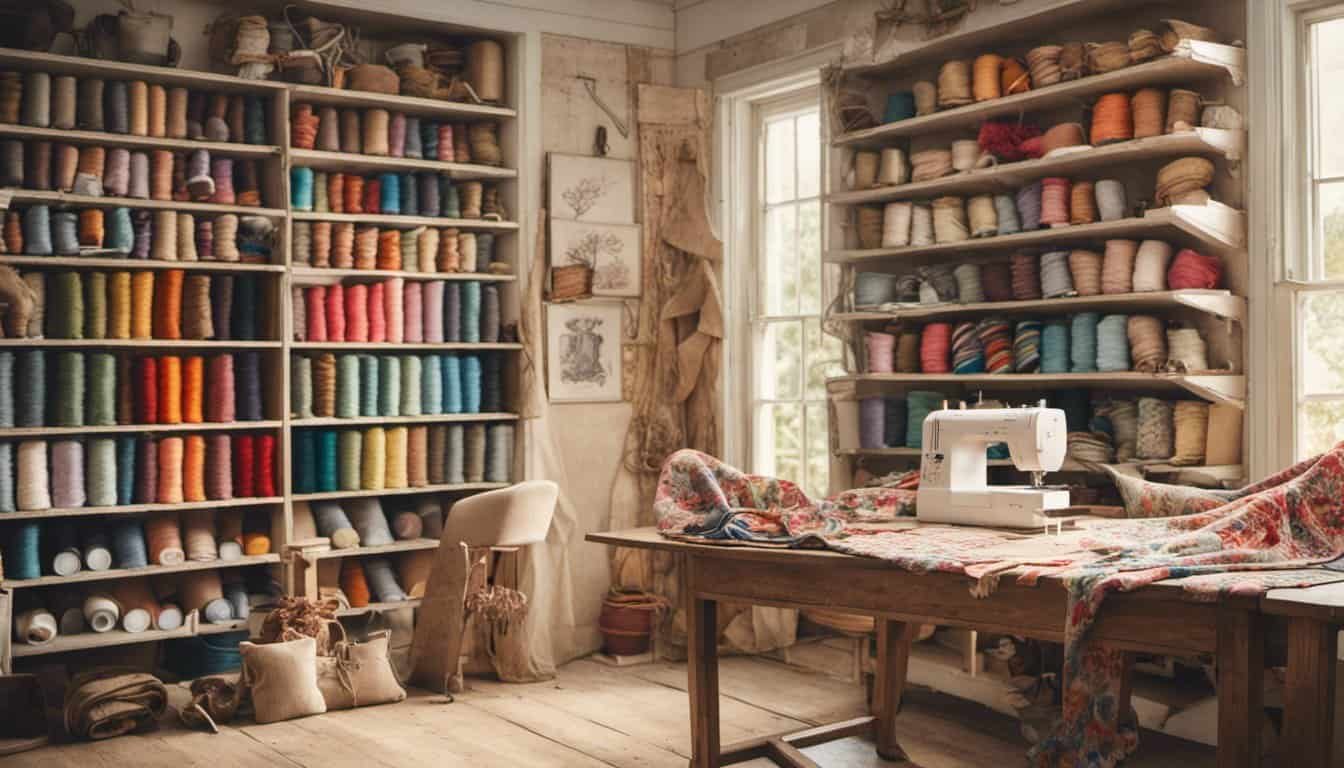
Broken Needles
It’s not uncommon to break a needle when sewing denim, especially if you’re using a regular presser foot. To avoid this, be sure to use a sharp needle and adjust the pressure on the foot as needed. If a needle does break, stop sewing immediately and replace the needle before continuing. Sewing with a broken needle can damage your machine and ruin your fabric.
The Role of Speed and Tension Control in Sewing Denim
When it comes to sewing denim, speed and tension control are two crucial factors that can make or break your project. As someone who has sewn many denim pieces, I can attest to the importance of these two elements in achieving a clean and professional-looking finished product.
Let’s start with speed. When sewing denim, it’s important to have a machine that can handle high speeds. This is because denim is a thick and heavy fabric, and a slow machine can cause the needle to get stuck or break. Look for a machine with a high speed setting, such as the Bernette 38, which has a speed of 820 stitches per minute (spm).
However, it’s important to note that while speed is important, it’s also crucial to have control over that speed. A machine with speed control settings can help you adjust the speed to match the thickness of the fabric and the complexity of the stitch pattern. This can help you avoid mistakes and achieve a more precise stitch.
Now, let’s talk about tension control. Denim is a sturdy fabric, and it requires a higher tension setting than lighter weight fabrics. This is because a higher tension can help the needle penetrate the fabric more easily and create a strong stitch. However, it’s important to find the right balance between tension and fabric thickness. Too much tension can cause the fabric to pucker or the thread to break, while too little tension can result in loose stitches.
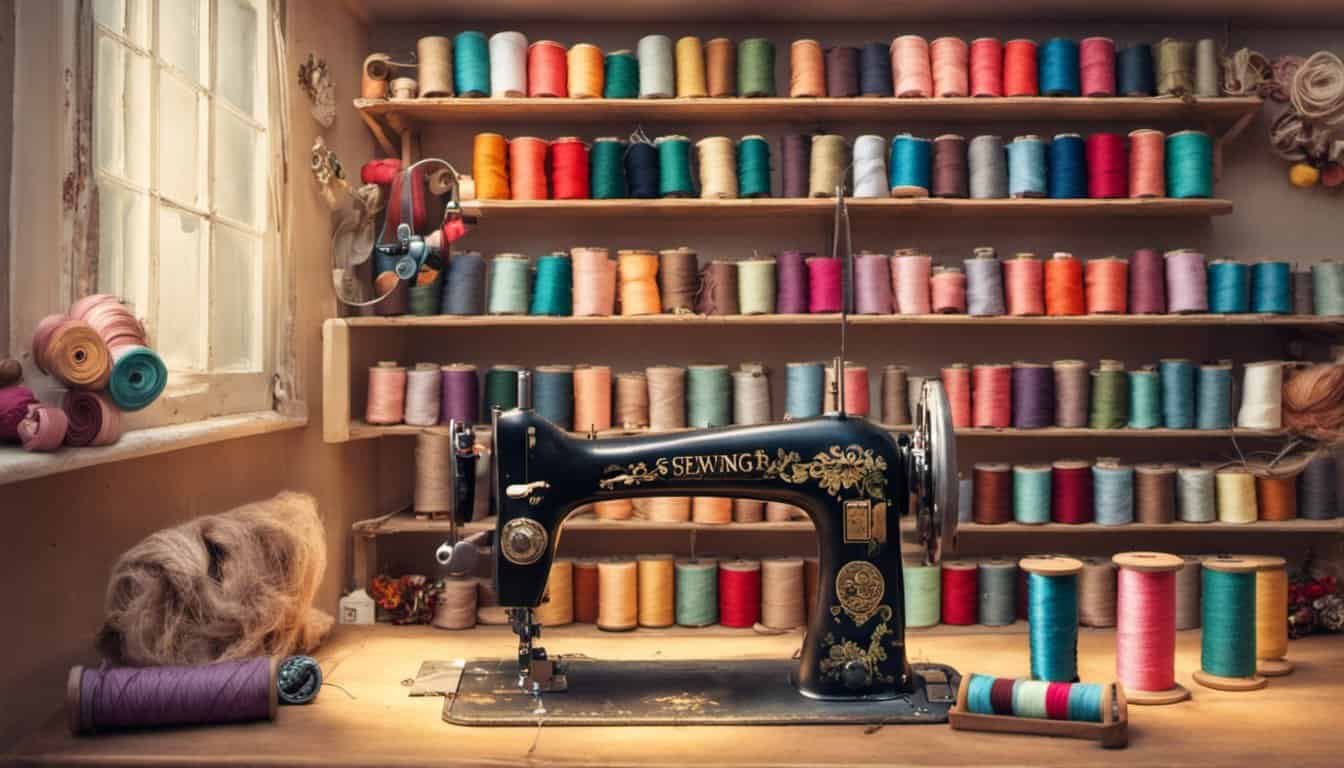
Look for a machine with adjustable tension settings, such as the Singer Heavy Duty 4423, which has a dial that allows you to adjust the tension to match the fabric you’re working with. It’s also important to test your tension setting on a scrap piece of denim before starting your project to ensure that it’s set correctly.
In summary, when sewing denim, it’s important to have a machine that can handle high speeds with control and adjustable tension settings. This can help you achieve a clean and professional-looking finished product.
The Convenience of Automatic Threading and Buttonholes
As someone who enjoys sewing, I know how important it is to have a sewing machine that is both efficient and easy to use. That’s why I highly recommend sewing machines with automatic threading and buttonhole features, especially when it comes to sewing denim.
Automatic threading is a great convenience, especially for those who have trouble threading the needle. With this feature, the machine does all the work for you, making it easier and quicker to get started on your sewing project. Some machines even have a built-in needle threader that can automatically thread the needle with just the push of a lever.
Another great feature to look for in a sewing machine is one-step buttonhole. This feature allows you to create buttonholes with just one step, making it much faster and easier than traditional methods. With this feature, you can easily create perfectly sized buttonholes for your denim projects.

When it comes to sewing denim, it’s important to have a machine that can handle the thickness and durability of the fabric. Sewing machines with automatic threading and buttonhole features are often heavy-duty machines that can easily handle denim and other tough fabrics.
In summary, automatic threading and one-step buttonhole features can make sewing projects much easier and quicker, especially when it comes to sewing denim. Look for a heavy-duty machine with these features to ensure that your sewing projects are efficient and successful.
Additional Features for Enhanced Sewing Experience
When it comes to sewing machines, additional features can make a big difference in the sewing experience. Here are some features to look out for when choosing a sewing machine for denim:
LCD Screen and LED Light
An LCD screen provides a clear view of stitch patterns and settings, making it easier to select the right stitch for your project. An LED light illuminates the sewing area, reducing eye strain and making it easier to see what you’re doing.
Free Arm
A free arm is a detachable part of the sewing machine that allows you to sew cylindrical items like sleeves and cuffs. This feature is essential for sewing denim pants.

Drop-in Bobbin
A drop-in bobbin is a type of bobbin system that makes it easy to change bobbins. This feature saves time and makes the sewing process more efficient.
Dials
Dials are an essential part of a sewing machine. They allow you to adjust the stitch length, width, and tension, giving you more control over your sewing.
Extension Table
An extension table provides a larger work surface, making it easier to handle large denim pieces. This feature is especially useful for quilters and those who work with large fabrics.
Accessory Kit
An accessory kit includes extra feet, needles, and bobbins. This kit is essential for those who want to experiment with different techniques and styles.
Backstitch
A backstitch is a feature that locks the stitches at the beginning and end of a seam. This feature ensures that the seam won’t unravel over time.

Cleaning
Cleaning a sewing machine is essential for its durability and longevity. Look for a machine that is easy to clean and maintain.
User-Friendly
A user-friendly sewing machine is easy to use, even for beginners. Look for a machine with clear instructions and an intuitive design.
Durability and Versatility
A durable sewing machine can withstand heavy use and last for years. Look for a machine made from high-quality materials that can handle thick denim fabric. A versatile machine can handle a variety of fabrics and sewing techniques, giving you more options for your projects.
By considering these additional features, you can choose a sewing machine that will not only handle denim but also enhance your sewing experience.
Sewing Machine Pricing and Value for Money
When it comes to buying a sewing machine for denim, pricing is an important factor to consider. The good news is that there are sewing machines available at various price points, so you can find one that fits your budget. However, it’s important to keep in mind that the cheapest option may not always be the best value for money in the long run.
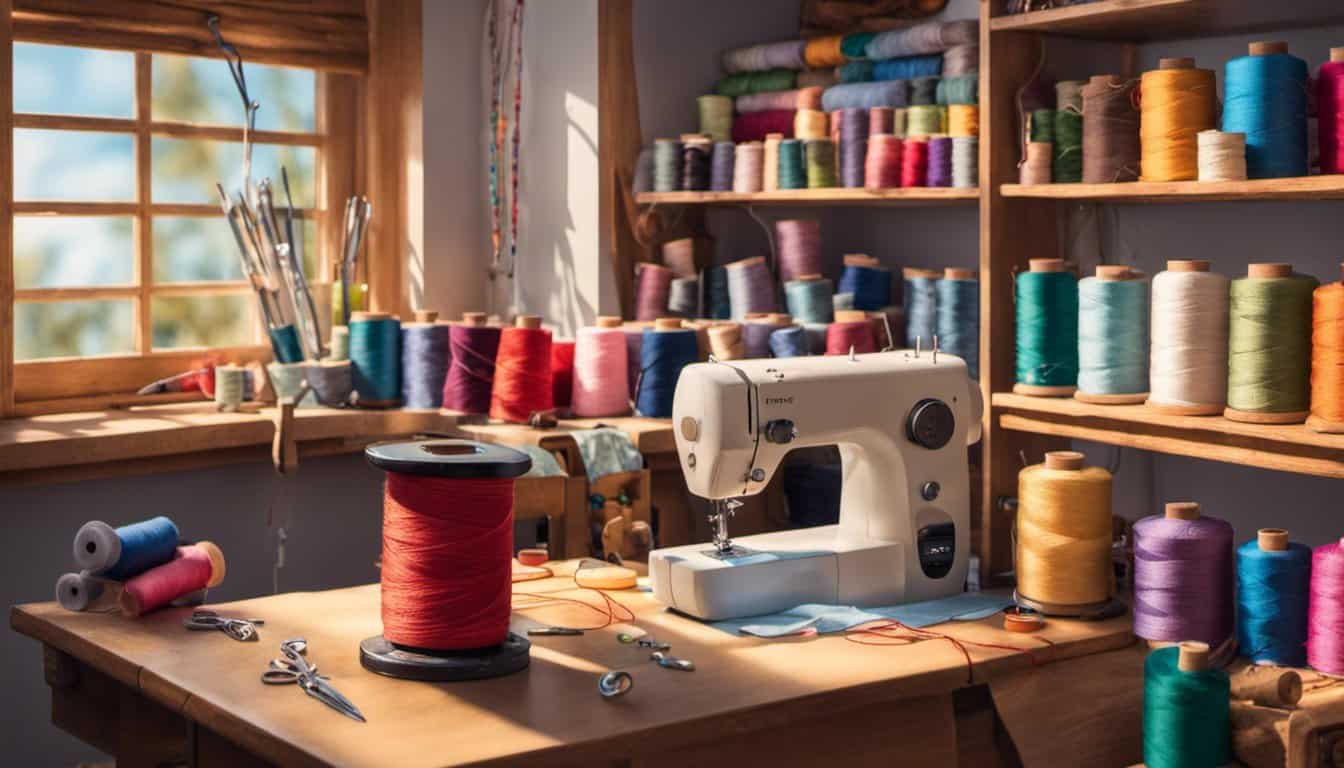
As a general rule, the more you spend on a sewing machine, the more features and capabilities it will have. For example, a higher-priced machine may be able to handle thicker layers of denim, have more stitch options, and come with more accessories. However, if you’re a beginner or only plan on using the machine for occasional denim sewing projects, you may not need all of these extra features.
If you’re on a tight budget, there are still affordable sewing machines available that can handle denim. For example, the Brother ST371HD is a great option that costs under $200. It has a heavy-duty metal frame, can sew through multiple layers of denim, and comes with several built-in stitches.
When considering the value for money of a sewing machine, it’s important to think about how much use you’ll get out of it. If you plan on using the machine frequently and for a variety of projects, it may be worth investing in a higher-priced machine with more features. On the other hand, if you only plan on using the machine occasionally or for simple projects, a more affordable option may be the better choice.
In conclusion, when shopping for a sewing machine for denim, it’s important to consider both the price and the value for money. While there are affordable options available, it’s important to weigh the features and capabilities against how much use you’ll get out of the machine. By doing so, you can find a sewing machine that fits both your budget and your sewing needs.
Popular Sewing Machines for Denim: A Closer Look
As someone who has worked with denim for years, I have come across many sewing machines that claim to be the best for denim. However, after trying out several machines, I have narrowed down my list to a few popular machines that I believe are worth considering.

One of the most popular machines for denim is the Singer Quantum Stylist 9960. It is a computerized sewing machine that offers a wide range of features that make it perfect for denim. The machine has 600 built-in stitches, including stretch stitches that are ideal for denim. It also has an automatic needle threader, which saves time and frustration. The machine is also lightweight and portable, making it easy to move around.
Another popular machine that is worth considering is the Brother CS7000X computerized sewing and quilting machine. This machine is designed for both beginners and advanced sewers. It has 70 built-in stitches, including decorative stitches that can be used to embellish denim. It also has an automatic needle threader and a drop-in bobbin system, which makes it easy to use.
The Brother XR9500PRW is another machine that is worth considering. It is a computerized sewing machine that has 100 built-in stitches, including decorative stitches that can be used to embellish denim. It also has an automatic needle threader and a drop-in bobbin system. The machine is lightweight and portable, making it easy to move around.
Finally, the Brother CS7000X computerized sewing and quilting machine is another machine that is worth considering. It has 70 built-in stitches, including decorative stitches that can be used to embellish denim. It also has an automatic needle threader and a drop-in bobbin system. The machine is lightweight and portable, making it easy to move around.
Overall, these popular sewing machines are worth considering if you are looking for a machine that can handle denim. Each machine has its own unique features that make it perfect for denim, so it is important to choose the one that best fits your needs.

Sewing Denim: Tips and Techniques
As someone who has sewn with denim before, I can tell you that it can be a bit tricky to work with. But with the right tips and techniques, you can make sewing denim a breeze. Here are some things to keep in mind:
Needles and Thread
When sewing with denim, it’s important to use the right needle and thread. A denim needle is a must-have, as it’s designed to easily penetrate through the thick fabric. I recommend using a size 90/14 or 100/16 needle, depending on the weight of your denim.
As for thread, I suggest using a sturdy all-purpose polyester thread for construction and upholstery or topstitching thread for topstitching. Make sure to use a thread that matches the color of your denim for a seamless look.
Stitch Length and Tension
When sewing denim, you’ll want to adjust your stitch length and tension accordingly. A longer stitch length (around 3-4mm) is best for denim, as it will allow the fabric to lay flat and prevent puckering. As for tension, I recommend adjusting it slightly higher than you would for lighter weight fabrics.
Seams and Finishing
When sewing seams on denim, it’s important to use a sturdy stitch, such as a straight stitch or a triple stitch. You can also reinforce your seams by finishing them with a zigzag stitch or a serger.
When it comes to finishing your denim project, there are a few options. You can hem your garment using a traditional hem, or you can opt for a rolled hem for a more casual look. Cuffs and sleeves can also be finished with a rolled hem or a simple fold-over hem.
Zippers and Buttons
Adding zippers and buttons to denim can be a bit tricky, but it’s definitely doable. When installing a zipper, make sure to use a sturdy zipper that can handle the weight of the denim. You can also reinforce the zipper area with interfacing for added strength.
As for buttons, I recommend using heavy-duty buttons that are specifically designed for denim. Make sure to reinforce the button area with interfacing or a buttonhole stitch to prevent the button from popping off.
Other Fabrics
While denim is the star of the show, you may also want to incorporate other fabrics into your project. Leather is a great option for adding a bit of edge to your denim project, while cotton can be used for lining or accents.
Denim is also a great fabric for home decor projects, such as curtains or pillow covers. And if you’re feeling adventurous, you can even try your hand at embroidery or monogramming on denim for a personalized touch.
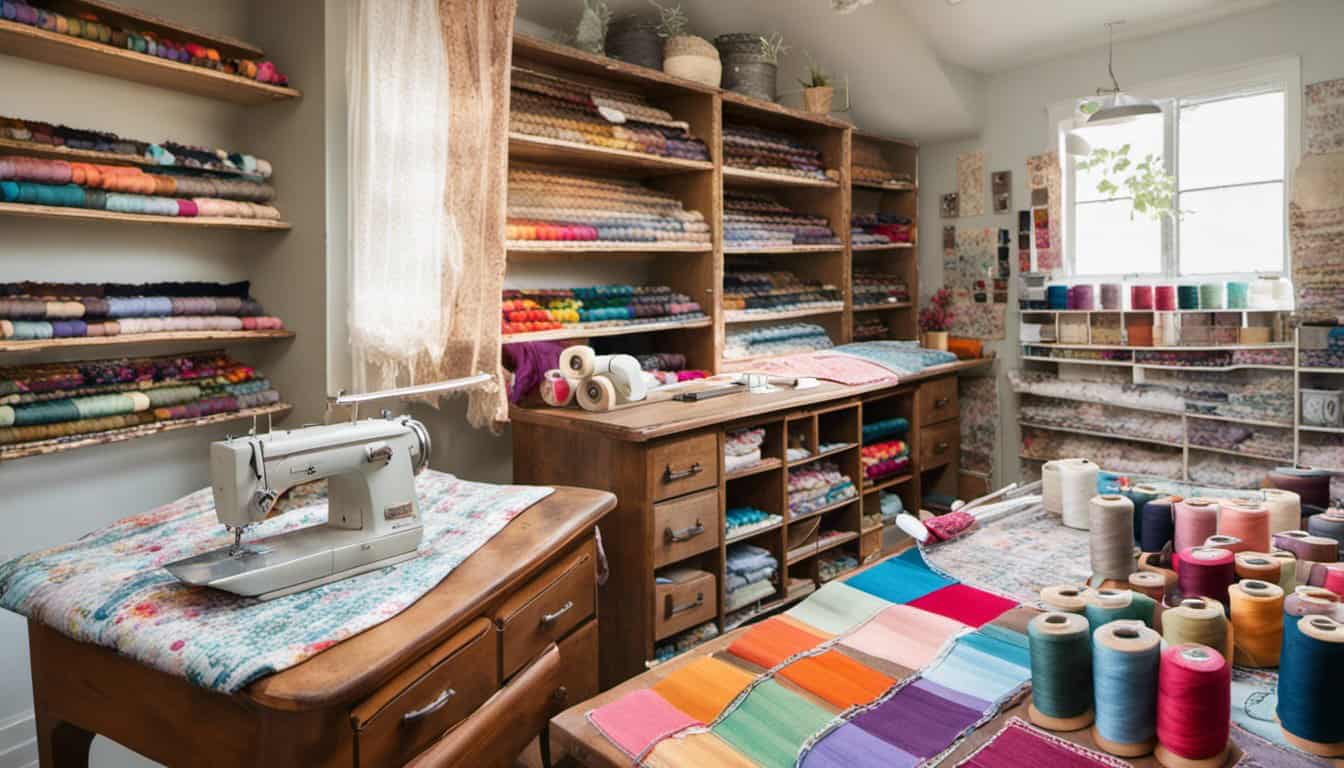
Overall, sewing with denim requires a bit of patience and attention to detail, but the end result is definitely worth it. With these tips and techniques, you’ll be able to create beautiful denim projects in no time.
Conclusion
After researching and analyzing various sewing machines for denim, I have come to the conclusion that the Janome HD3000 is the best option for those who want to work with heavyweight fabrics such as denim, upholstery, and leather. With its powerful motor, the machine can handle multiple layers of fabric with ease, making it perfect for both beginners and experienced sewers.
The Bernette 38 is another great option for those who want a computerized sewing machine with a wide range of stitch patterns. It features automatic limitation for double needles and adjustable pressure for the presser foot, making it a versatile machine for different fabrics.
If you are looking for an industrial sewing machine for denim, the Juki TL-2010Q is the best choice. With its high-speed stitching and large throat space, this machine is perfect for heavy-duty projects.
Other machines that are worth considering include the Brother PQ1500SL, Singer Heavy Duty 4432, and Singer 4423 Heavy Duty. These machines are all designed to handle heavyweight fabrics and come with a range of features that make sewing easier and more enjoyable.

Ultimately, the best sewing machine for denim will depend on your specific needs and preferences. Whether you are a beginner or an experienced sewer, there is a machine out there that will help you create beautiful projects with ease.
Frequently Asked Questions
What are some good sewing machines for heavy fabrics like denim and leather?
When it comes to sewing heavy fabrics like denim and leather, you need a sewing machine that is powerful enough to handle the thickness of these materials. Some good options include the Singer 4452 Heavy Duty Sewing Machine, the Janome HD3000 Heavy-Duty Sewing Machine, and the Brother ST371HD Strong and Tough Sewing Machine. These machines are designed to handle thick fabrics with ease and can help you achieve professional-looking results.
Which sewing machine is best for hemming jeans?
Hemming jeans can be a challenge, but there are sewing machines that are specifically designed for this task. The Janome HD1000 Black Edition Sewing Machine is a great option for hemming jeans. It has a powerful motor and can handle multiple layers of denim with ease. Another good option is the Singer 4423 Heavy Duty Sewing Machine, which also has a strong motor and can sew through thick layers of fabric.
Can a regular sewing machine sew denim?
While a regular sewing machine can sew denim, it may not be the best option for this task. Denim is a thick and heavy fabric, and a regular sewing machine may not have the power or features needed to handle it. If you plan on sewing denim regularly, it is recommended that you invest in a heavy-duty sewing machine that is designed for this type of fabric.
What are some recommended industrial sewing machines for denim?
If you are looking for an industrial sewing machine for denim, some good options include the Juki DDL-8700 Industrial Straight Stitch Sewing Machine, the Consew 206RB-5 Industrial Sewing Machine, and the Singer CG590 Commercial Grade Sewing Machine. These machines are designed to handle heavy fabrics and can help you achieve professional-looking results.
What features should I look for in a sewing machine for sewing denim?
When looking for a sewing machine for sewing denim, there are several features to consider. Look for a machine with a powerful motor, adjustable presser foot pressure, and a wide range of stitch options. It is also important to choose a machine with a sturdy and durable construction, as denim can be tough on sewing machines.
Do I need a special sewing machine to make jeans?
While you don’t necessarily need a special sewing machine to make jeans, it is recommended that you use a heavy-duty machine that is designed for sewing thick fabrics. Look for a machine with a strong motor and the ability to handle multiple layers of denim. It is also important to choose a machine with a variety of stitch options, as different types of stitches may be needed when sewing jeans.





